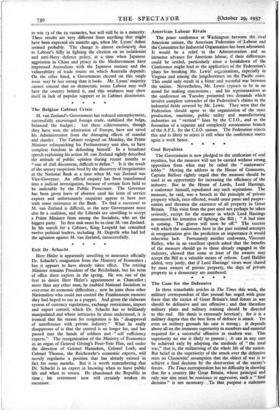The Belgian Cabinet Crisis M. van Zeeland's Government has reduced
unemployment, successfully encouraged foreign trade, stabilised the belga, balanced the budget ; but these achievements, though they have won the admiration of Europe, have not saved his Administration from the damaging effects of scandal and slander. The Cabinet resigned on Monday, the Prime Minister relinquishing his Parliamentary seat also, to have complete freedom in defending himself. In a broadcast speech explaining his action M. van Zeeland rightly described the attitude of public opinion during recent months as "one of dull discontent, difficult to define." It is the result of the uneasy suspicions bred by the discovery of irregularities at the National Bank at a time when M. van Zeeland was Vice-Governor. An official enquiry has been transformed into a judicial investigation, because of certain facts held to be indictable by the Public Prosecutor. The Governor has been given leave of absence until his term of service expires and unfortunately enquiries appear to have met with some resistance at the Bank. To find a successor to M. van Zeeland is difficult, as the next Government must also be a coalition, and the Liberals are unwilling to accept a Prime Minister from among the Socialists, who are the biggest party. Its first task must be to clear M. van Zeeland. In his search for a Cabinet, King Leopold has consulted twelve political leaders, including M. Degrelle who had led the agitation against M. van Zeeland, unsuccessfully.


























































 Previous page
Previous page